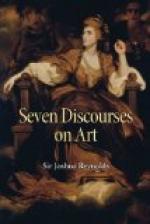We are happy in having a prince who has conceived the design of such an institution, according to its true dignity, and promotes the arts, as the head of a great, a learned, a polite, and a commercial nation; and I can now congratulate you, gentlemen, on the accomplishment of your long and ardent wishes.
The numberless and ineffectual consultations that I have had with many in this assembly, to form plans and concert schemes for an academy, afford a sufficient proof of the impossibility of succeeding but by the influence of Majesty. But there have, perhaps, been times when even the influence of Majesty would have been ineffectual, and it is pleasing to reflect that we are thus embodied, when every circumstance seems to concur from which honour and prosperity can probably arise.
There are at this time a greater number of excellent artists than were ever known before at one period in this nation; there is a general desire among our nobility to be distinguished as lovers and judges of the arts; there is a greater superfluity of wealth among the people to reward the professors; and, above all, we are patronised by a monarch, who, knowing the value of science and of elegance, thinks every art worthy of his notice that tends to soften and humanise the mind.
After so much has been done by his Majesty, it will be wholly our fault if our progress is not in some degree correspondent to the wisdom and, generosity of the institution; let us show our gratitude in our diligence, that, though our merit may not answer his expectations, yet, at least, our industry may deserve his protection.
But whatever may be our proportion of success, of this we may be sure, that the present institution will at least contribute to advance our knowledge of the arts, and bring us nearer to that ideal excellence which it is the lot of genius always to contemplate and never to attain.
The principal advantage of an academy is, that, besides furnishing able men to direct the student, it will be a repository for the great examples of the art. These are the materials on which genius is to work, and without which the strongest intellect may be fruitlessly or deviously employed. By studying these authentic models, that idea of excellence which is the result of the accumulated experience of past ages may be at once acquired, and the tardy and obstructed progress of our predecessors may teach us a shorter and easier way. The student receives at one glance the principles which many artists have spent their whole lives in ascertaining; and, satisfied with their effect, is spared the painful investigation by which they come to be known and fixed. How many men of great natural abilities have been lost to this nation for want of these advantages? They never had an opportunity of seeing those masterly efforts of genius which at once kindle the whole soul, and force it into sudden and irresistible approbation.
Raffaelle, it is true, had not the advantage of studying in an academy; but all Rome, and the works of Michael Angelo in particular, were to him an academy. On the site of the Capel la Sistina he immediately from a dry, Gothic, and even insipid manner, which attends to the minute accidental discriminations of particular and individual objects, assumed that grand style of painting, which improves partial representation by the general and invariable ideas of nature.




